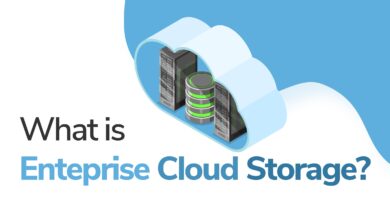Unveiling the Power of Hybrid Cloud Storage Solutions: A Comprehensive Overview

In today’s rapidly evolving digital landscape, businesses face the challenge of managing and storing vast amounts of data efficiently, securely, and cost-effectively. Hybrid cloud storage solutions have emerged as a powerful and flexible option, combining the benefits of both private and public cloud storage. In this article, we will delve into the world of hybrid cloud storage solutions, exploring their architecture, benefits, challenges, and key considerations for implementation.
Understanding Hybrid Cloud Storage Solutions
Definition and Architecture

Hybrid cloud storage is a storage infrastructure that integrates on-premises private cloud storage with public cloud storage services.
It allows organizations to leverage the scalability and cost-effectiveness of the public cloud while retaining control and security over sensitive data through private cloud storage.
Hybrid Cloud Storage Components
On-Premises Infrastructure: Private cloud storage resources, including servers, storage arrays, and network infrastructure.
Public Cloud Storage Services: Offerings from cloud providers, such as Amazon S3, Microsoft Azure Blob Storage, or Google Cloud Storage.
Data Gateway: Acts as a bridge between on-premises infrastructure and public cloud storage, enabling seamless data movement.
Benefits of Hybrid Cloud Storage Solutions
Scalability and Flexibility
Hybrid cloud storage enables organizations to scale their storage infrastructure dynamically based on changing data demands.
It provides the flexibility to store less sensitive data in the public cloud while keeping critical and sensitive data on-premises.
Cost Optimization
Hybrid cloud storage optimizes costs by allowing organizations to choose the most cost-effective storage option for different types of data.
It eliminates the need for large upfront investments in infrastructure and provides the ability to pay for public cloud storage on a pay-as-you-go basis.
Data Resilience and Redundancy

Hybrid cloud storage solutions ensure data resilience by replicating and distributing data across multiple locations and storage tiers.
In the event of a disaster or hardware failure, organizations can quickly recover their data from off-site backups.
Enhanced Security and Compliance
Hybrid cloud storage enables organizations to keep sensitive data within their private infrastructure, addressing security and compliance concerns.
Public cloud storage providers offer robust security measures, such as encryption, access controls, and compliance certifications.
Challenges and Considerations of Hybrid Cloud Storage Solutions
Data Transfer and Latency
Transferring large volumes of data between on-premises infrastructure and the public cloud can be time-consuming and impact application performance.
Proper planning, optimization techniques, and efficient data transfer mechanisms are crucial to mitigate latency issues.
Data Governance and Compliance
Organizations must ensure that data stored in the hybrid cloud complies with industry regulations and internal governance policies.
Clear data classification, access controls, and encryption mechanisms should be implemented to maintain data integrity and privacy.
Vendor Selection and Integration
Choosing the right cloud storage providers and data gateway solutions is vital for a successful hybrid cloud storage implementation.
Compatibility, performance, scalability, and vendor support should be evaluated to ensure seamless integration between on-premises and public cloud storage.
Hybrid Cloud Management

Managing a hybrid cloud storage environment requires robust orchestration and management tools.
Centralized monitoring, automation, and unified control across different storage platforms simplify operations and ensure optimal performance.
Implementation Best Practices
Define Your Objectives: Clearly define your goals and objectives for implementing a hybrid cloud storage solution. Identify the types of data that require high security and control versus those that can benefit from the scalability and cost savings of the public cloud.
Data Classification and Tiering: Classify your data based on its sensitivity, importance, and access requirements. Establish data tiering strategies to determine which data should reside on-premises and which can be stored in the public cloud.
Evaluate Cloud Storage Providers: Research and evaluate different cloud storage providers based on their performance, security measures, pricing models, service-level agreements (SLAs), and data compliance capabilities. Consider factors such as geographic availability, data sovereignty, and integration options.
Data Encryption and Security: Implement robust encryption mechanisms for data both at rest and in transit. Ensure that encryption keys are securely managed and controlled. Leverage security features provided by cloud storage providers, such as access controls, authentication mechanisms, and audit logs.
Data Transfer and Migration: Develop efficient data transfer strategies to minimize latency and downtime during data migration between on-premises infrastructure and the public cloud. Utilize tools like data compression, deduplication, and incremental transfers to optimize data movement.
Hybrid Cloud Management Tools: Invest in comprehensive management and monitoring tools that provide a unified view of your hybrid cloud storage environment. These tools should enable efficient provisioning, performance monitoring, capacity planning, and automation of data management tasks.
Conclusion
Hybrid cloud storage solutions provide a strategic approach to address the challenges of managing data in the digital era. By combining the scalability and cost benefits of public cloud storage with the control and security of private cloud storage, organizations can achieve flexibility, cost optimization, data resilience, and enhanced security.
Conclusion: So above is the Unveiling the Power of Hybrid Cloud Storage Solutions: A Comprehensive Overview article. Hopefully with this article you can help you in life, always follow and read our good articles on the website: Wikifont.net




